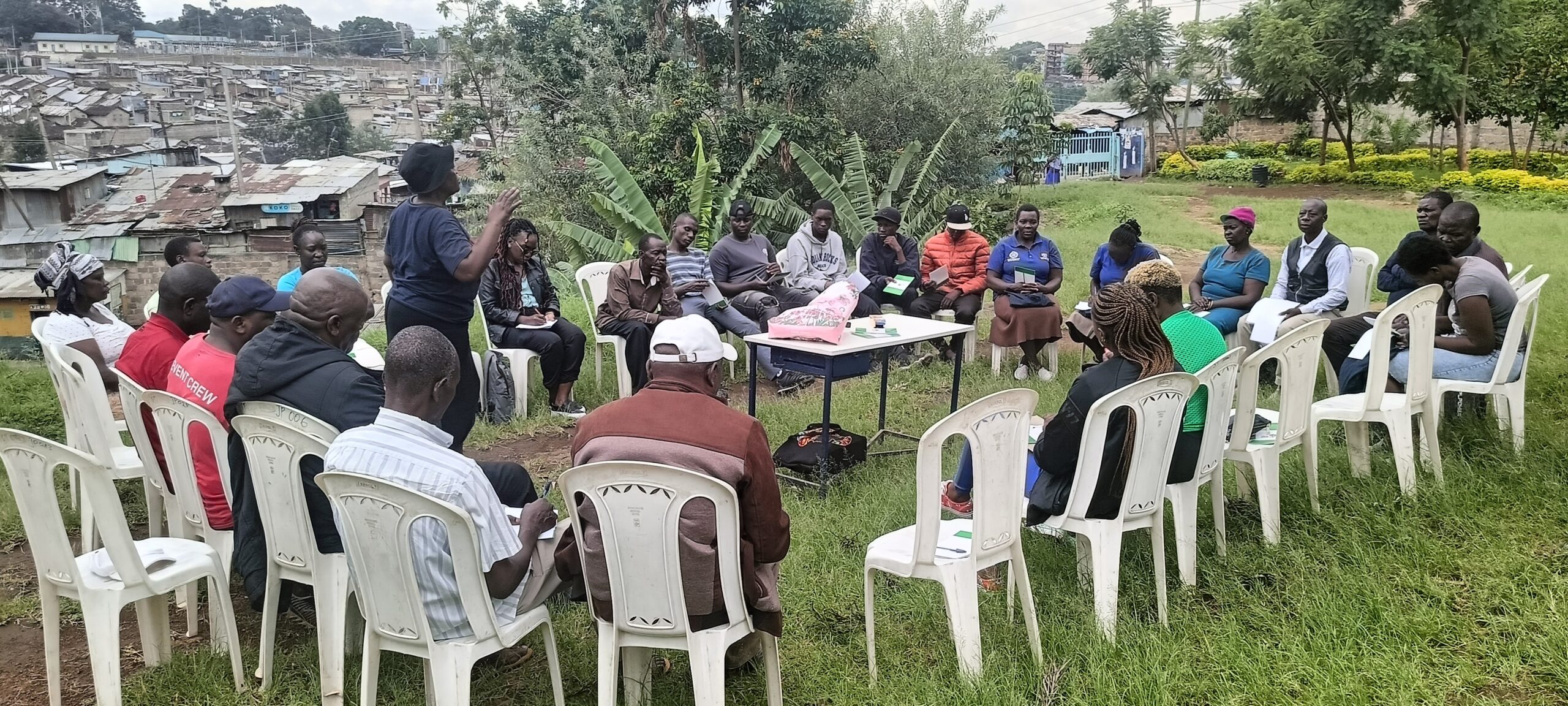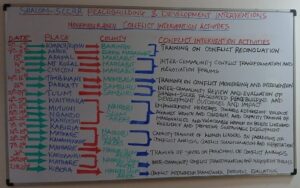By: Judith Akedi MA,
Through its interventions in Nairobi’s slum areas, Shalom-SCCRR has trained to a high level more than 6,000 key influential opinion shapers in Conflict Transformation and Peacebuilding; more than 220 training workshops completed; 56 School/Educational Projects Completed; over 19,000 pupils and students benefited from the Shalom-SCCRR school/educational development projects; and 33 primary, secondary schools and children rescue centres supported with school/educational infrastructure, learning, and teaching materials.
“Violence is a monster that is ever present in our slum areas. Slums have become synonymous with violence, crime, criminalization of youth and ‘illicit’ income activities. The feeling of oppression and deprivation makes the entire settlement insecure. Violence within slums is the consequence of structural violence against the poor and marginalized, and state responses that have failed to address the problem. Even the most recent revolt led by the young people (Gen Z Movement) in Kenya is rooted in structural violence.” Mr. Kamau, Lead Community Facilitator, Mathare
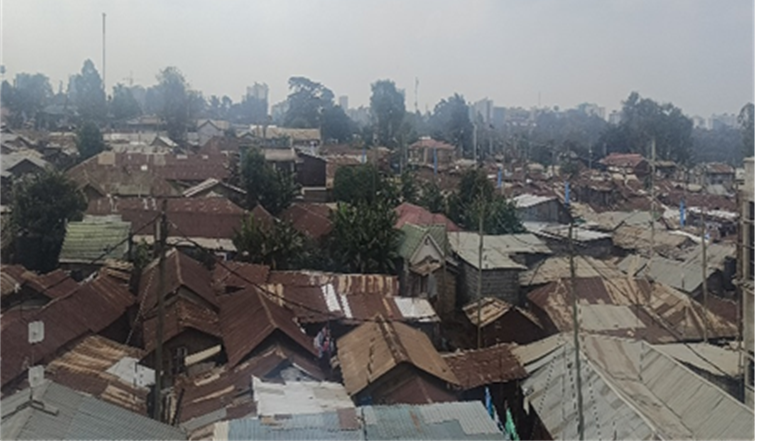
It is estimated that Nairobi’s slums, such as Kibera, Kangemi, Korogocho and Mathare, host 60% of the city’s population, occupying only 5.8 % of the city’s residential land, with some areas having a population density of 63,000 people per square kilometer. This translates to about 2 million people living in a small portion of government-owned land, depriving slum-dwellers of security tenure. Since the 1990s, city space in Nairobi, occupied by the poorer half of its population, has not increased. While slum populations may have doubled at this time, the rate and scale of improvements on the welfare of the dweller have failed to match the unrelenting densification and consolidation.
The slum areas in Nairobi are grappling with structural violence problems. Communities struggle to meet basic human and ontological needs (identity, security, recognition etc.). The drivers of conflict and struggle for survival have been conceptualized to include political instability, socio-economic disparities, perceptions of injustice, unfairness, relational, group dynamics and weakened social bonds. These inequalities and poor living conditions of slum dwellers often result in growing sentiments of being marginalized and excluded, which in turn translate into social disruption and conflict.
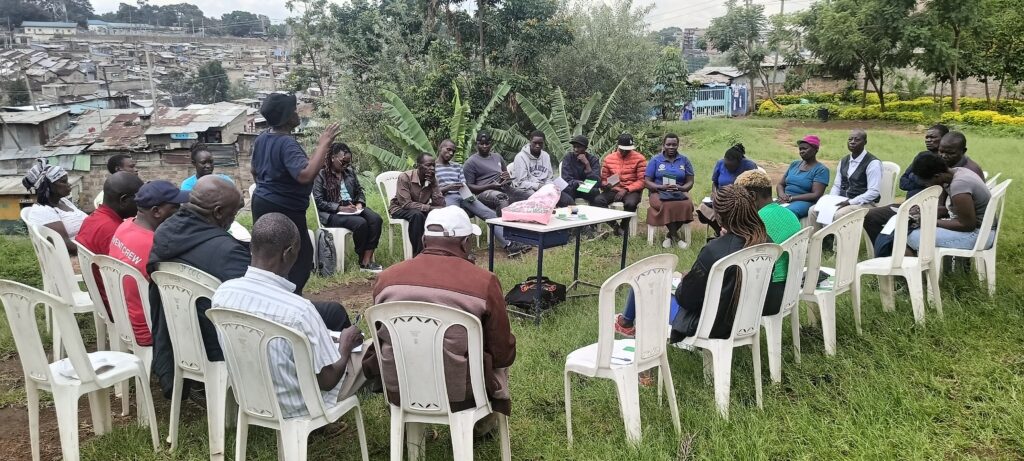
Power struggles between politicians have fueled conflict along ethnic lines in Nairobi’s Slums. Elective political posts are perceived to provide access to economic resources. Consequently, politicians incite inter-ethnic rivalry, escalating tensions and undermining the benefits of peaceful coexistence so that they can solidify inter-ethnic misunderstanding and tighten their grip on existing economic resources.
Political manipulation exacerbates the already fragile inter-ethnic relations, leaving slum dwellers in a cycle of poverty and conflict. In a slum-like Mathare (one of the oldest settlements in Nairobi), there are high levels of intergenerational and concentrated poverty. A young man in Mathare explained this process:
Here in Mathare, you will find a young man who is 17 years old whose father was a thief and his grandfather a thug, all killed by the police…this young man (now a teenage father) will die and leave behind his wife and a young child who will grow without even knowing who his father was. At this rate, this child will end up dead…if the child is a girl, she might also be having a story of disadvantage passed on from her mother or father.
In a recently conducted training workshop which brought on board young people from various parts of Mathare slums, a variety of conflict issues were highlighted key among them being structural and horizontal violence in their analysis of conflict and power. On horizontal violence, they raised concerns about the state’s use of excess force to deal with young people. Issues of extrajudicial killings and continuous police harassment were discussed. In addition, participants talked of how youths have lost their self and social esteem and suffer from psychological and emotional traumas without redress.
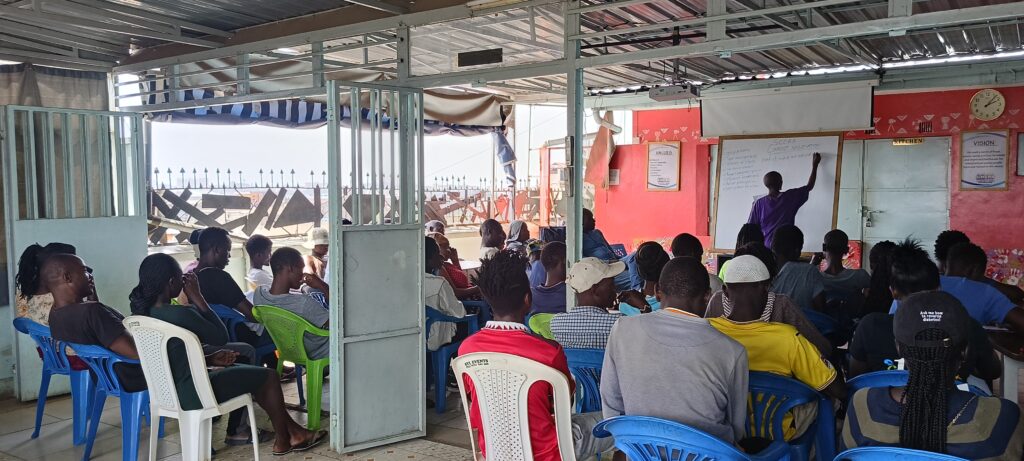
Youth face difficult trauma and stress issues in informal urban settlements (slums). Our young people deserve maximum care and attention not only because they are leaders of tomorrow but because they have immediate needs right now. Over the years, Shalom-SCCRR’s interventions have increasingly focused on the prevention of human and organ trafficking. Similarly, the organization strives to counter recruitment to Religious Ideological Extremism and transform its underlying causes.
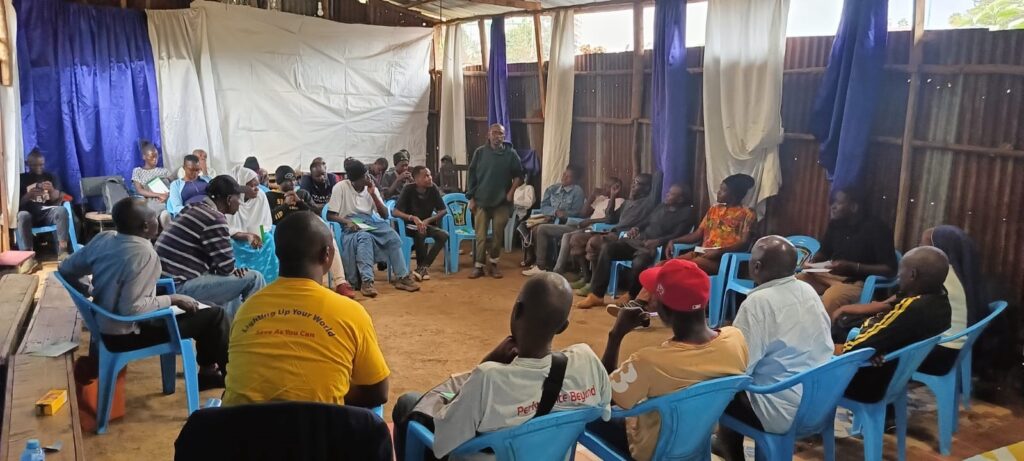
Unpacking these challenges requires a multiple-stakeholder approach. The approach to address the inequity, injustices and lack of accountability and responsiveness by those with the mandate to tackle injustice should be systematic and must engage those living in the affected slum areas. In the slums of Nairobi, Shalom-SCCRR’s interventions have been implemented through a continuous participatory process of identifying and involving significantly influential individuals who shape opinions through community-based meetings. The intervention framework consisted of conducting workshops to provide training on paradigms of conflict analysis, mapping out conflicts, facilitating transformative negotiations and mediation and reconciliation between different communities leading to mutually beneficial joint development initiatives. Furthermore Shalom schools/educational projects (including infrastructure and learning equipment), and contributes towards entrenching the culture of peace in school through peace education, among other vital areas of capacity building and development.
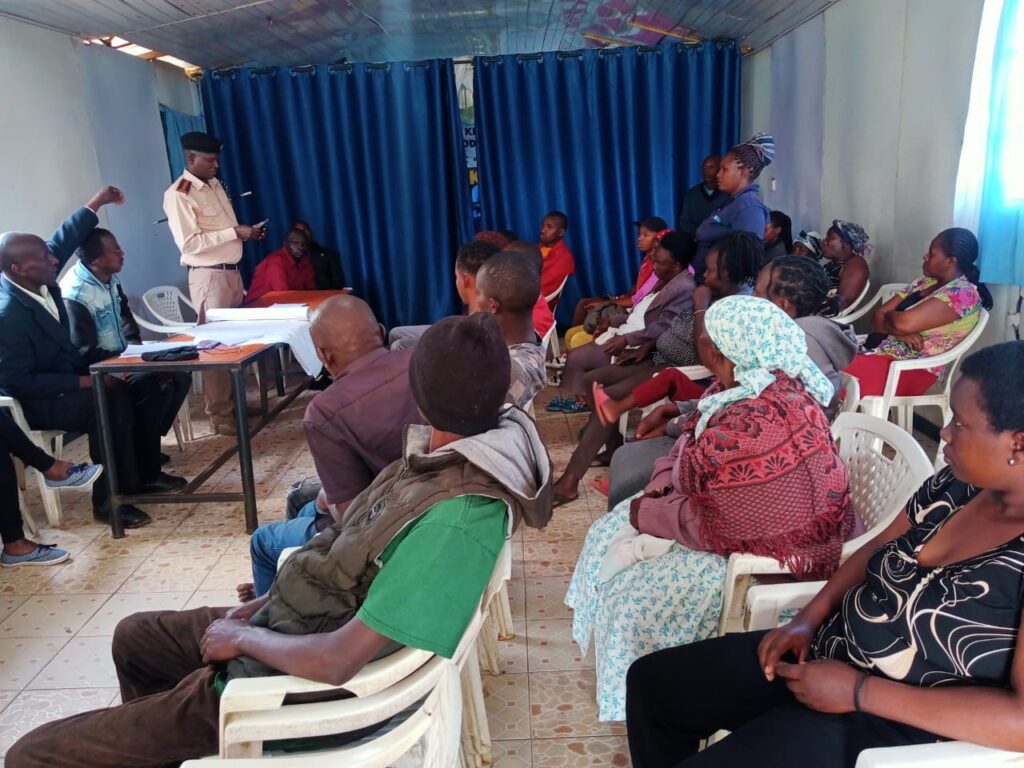
As mentioned above, through its interventions in Nairobi’s slum areas, Shalom-SCCRR has trained to a high level more than 6,000 Key influential opinion shapers in Conflict Transformation and Peacebuilding; more than 220 training workshops completed; 56 School/Educational Projects Completed; over 19,000 pupils and students benefited from the Shalom-SCCRR school/educational development projects; and 33 primary, secondary schools and children rescue centres supported with school/educational infrastructure, learning, and teaching materials.
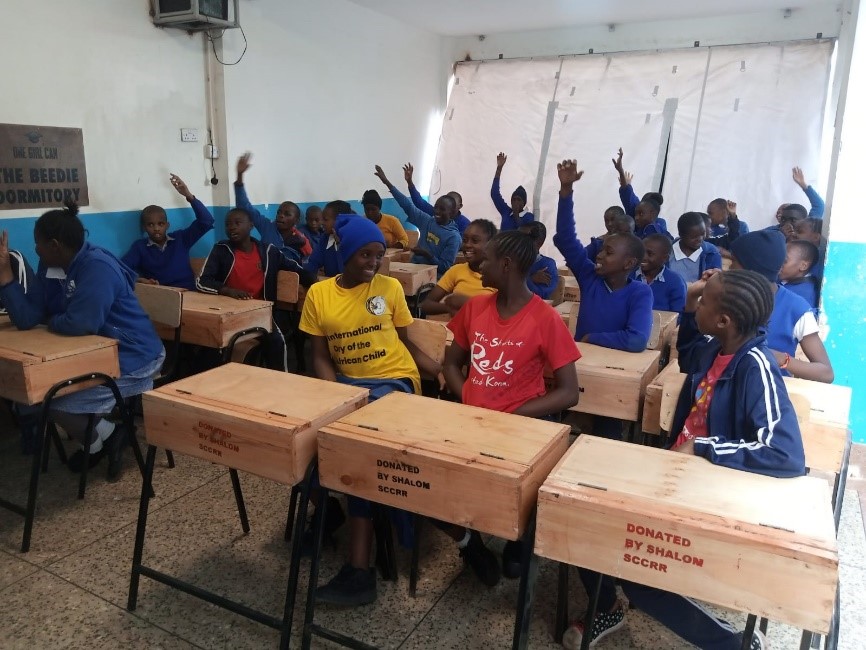
Shalom-SCCRR, through its trained Community Resource Persons (CRPs), has coordinated community groups that drive meaningful change for conflicts arising at the community level. Through training workshops, Shalom-SCCRR has successfully dismantled the misconceptions, conjectures, mendacious and half-truths surrounding conflict, thus contributing towards mobilizing communities to recognize the signs and advocate for policy reforms in the slum areas for successful progress towards positive peace. In the process, Shalom-SCCRR has built strategic partnerships and empowered key influential opinion leaders within slum communities.
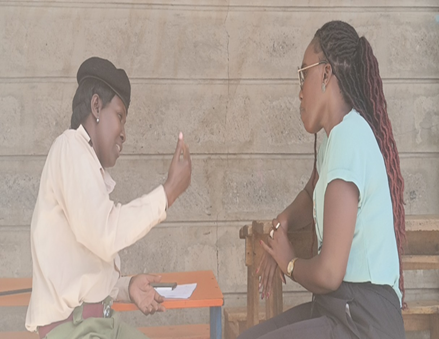
The Kibera, Mathare, Kariobangi and Korogocho community leaders expressed their heartfelt thanks to Shalom-SCCRR. Senior Chief of Mathare, Mrs. Rose, admits that she would only do much for her community with the analytical skills acquired through SCCRR workshops and the growth process Shalom has taken her through. She reiterated, “The workshops facilitated by Shalom-SCCRR have been eye-openers and empowerment to community leaders who previously lacked the necessary skills to engage in peacebuilding and conflict transformation. The work undertaken by Shalom-SCCRR should serve as a model for conflict transformation work in other slums elsewhere. Shalom’s approach should be known worldwide.”
Author: Mrs. Judith Akedi Otsieno MA, Shalom-SCCRR Project Officer Nairobi; & Women and Children’s Projects
RELEVANT LINKS
- Shalom-SCCRR. (2024). 2023 Shalom-SCCRR Results and Achievements. https://shalomconflictcenter.org/wp-content/uploads/2024/01/2023-Peacebuidling-Conflict-Transformation.pdf
- Shalom-SCCRR. (2024). 2009-2023 Shalom-SCCRR Results and Achievements. https://shalomconflictcenter.org/wp-content/uploads/2024/05/14-Years-of-Shalom-SCCRR-2009-2023-LV-Full-Report.pdf
- Shalom-SCCRR. (2024). 2023 Shalom-SCCR School/Educational Developments Results and Achievements. https://shalomconflictcenter.org/2023-shalom-sccrr-school-educational-developments-results-and-achievements/.
- Noonan, O., Okoth G., & Kibe, E. (2024). The Intergovernmental Agency for Development (IGAD) and Shalom Center for Conflict Resolution and Reconciliation (SCCRR): MoUs Operationalized in Peace and Development. https://shalomconflictcenter.org/the-intergovernmental-agency-for-development-igad-and-shalom-center-for-conflict-resolution-and-reconciliation-sccrr-mous-operationalized-in-peace-and-development/
- Butler, J. (Oct, 2023). Harvard Kennedy School; A Conversation with Rev. Dr. Patrick Devine and Paula Soumaya Domit. https://shalomconflictcenter.org/wp-content/uploads/2024/01/Harvard_Kennedy_School_Article_WITH_PHOTOS_MAP_1_17_24_FINAL.pd
- Domit, P. S. & Devine, P. (2024).Shalom Center for Conflict Resolution and Reconciliation (SCCRR): Addressing the Violence of Human and Organ Trafficking. https://shalomconflictcenter.org/shalom-center-for-conflict-resolution-and-reconciliation-sccrr-addressing-the-violence-of-human-and-organ-trafficking/
- Nyambura, J. (2024). Combating Human and Organ Trafficking: Shalom-SCCRR’s Step towards Protecting Vulnerable Lives. https://shalomconflictcenter.org/combating-human-and-organ-trafficking-shalom-sccrrs-step-towards-protecting-vulnerable-lives/
- Otsieno, J. (2020). Briefing Paper No 1: A Conflict Analysis of Nairobi’s Informal Settlements. https://shalomconflictcenter.org/briefing-paper-no-1/
- Otsieno, J. (2020). Thousands of Children and Families in Nairobi’s Korogocho Slum Benefit from Shalom-SCCRR Transforming Interventions. https://shalomconflictcenter.org/thousands-of-children-and-families-in-nairobis-korogocho-slum-benefit-from-shalom-sccrr-transforming-interventions/
- Otsieno, J., Kibe, E. & Osiro, M. (2023). Shalom-SCCRR Peace Education in violent and deprived locations: Interventions within Schools in Kenya’s Urban Informal Settlements (Slums) of Kibera, Mathare, and Kariobangi. https://shalomconflictcenter.org/shalom-sccrr-peace-education-in-violent-and-deprived-locations-interventions-within-schools-in-kenyas-urban-informal-settlements-slums-of-kibera-mathare-and-kariobangi/
- Kibe, E, Salah, I. A. & Osiro, M. (2023). The Informal Settlements (Slums) of Nairobi; Shalom-SCCRR Enhancing Women’s Capacity in Conflict Transformation and Peacebuilding. https://shalomconflictcenter.org/the-informal-settlements-slums-of-nairobi-shalom-sccrr-enhancing-womens-capacity-in-conflict-transformation-and-peacebuilding/
- Domit, P. S. & Devine, P. (2024).Shalom Center for Conflict Resolution and Reconciliation (SCCRR): Addressing the Violence of Human and Organ Trafficking. https://shalomconflictcenter.org/shalom-center-for-conflict-resolution-and-reconciliation-sccrr-addressing-the-violence-of-human-and-organ-trafficking/
- Lugonzo, F. (2018). Conflict transformation, Radicalization and Extremism in Eastern Africa. https://shalomconflictcenter.org/conflict-transformation-radicalization-and-extremism-in-eastern-africa/
- Devine, P. R. (2017). “Radicalization and Extremism in Eastern Africa; Dynamics and Drivers”, published in the Journal of Mediation and Applied Conflict Analysis, 4 (2).http://mural.maynoothuniversity.ie/9086/7/PD-Radicalisation-2017.pdf
- Okoth, G. & Mwangi, F. (2022). Shalom-SCCRR Facilitates at AMECEA Forum on Addressing Religious Ideological Extremism in Eastern Africa. https://shalomconflictcenter.org/shalom-sccrr-facilitates-amecea-forum-on-addressing-religious-ideological-extremism-in-eastern-africa/
- Shalom-SCCRR. (2022). Shalom Empowerment Center (SEC) Addressing Violence against Women and Children: Concept Document.https://shalomconflictcenter.org/eastern-africa-shalom-empowerment-center-sec-addressing-violence-against-women-and-children-concept-document/
- Moran, M. (2022). Shalom Empowerment Center opens in Nairobi, Kenya. https://www.indcatholicnews.com/news/45158
- Otsieno, J. & Kibe, E. (2022). Shalom Empowerment Center (SEC) Addressing Violence against Women and Children: A Unique Shalom-SCCRR Initiative Opened. https://shalomconflictcenter.org/shalom-empowerment-center-sec-addressing-violence-against-women-and-children-a-unique-shalom-sccrr-initiative-opened/

